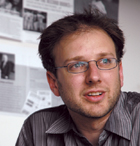From the editor: Bold experiments can be convincing
 |
Physicists live to experiment: usually in a lab, but at times in different venues. The National Academies committee that recently looked into the future of US particle physics was a new kind of non-laboratory experiment for the physics community. Realizing that their field was facing a turning point–gradual decline versus bold steps toward an ambitious future–physicists effectively put their fate in the hands of those outside their profession. The EPP2010 committee, as it was known, included enough non-physicists to keep the physicists from automatically controlling the decision-making. Thus, conclusions were not foreordained.
Although the EPP2010 report makes no binding decisions and has no official influence, it is an important sign to policy makers from Congress' independent science advisory body. The diverse group, whose members are accustomed to making high-level decisions about the futures of organizations, recommended an admittedly risky path for US particle physics. But it emphasizes that all possible paths are risky: continuing the status quo only promises the field will wither over time.
No set of recommendations can please everybody, especially those with strongly vested interests in particular projects. What is important now is how physicists respond to this report.
At some point, physicists need to convince the wider community of the value in spending a lot of public money to pursue their plans and ambitions. Would physicists rather take the case directly to the public, where the processes of spin can easily dominate a debate? Or would they like to go directly to Congress, where political and time pressures might be decisive? The EPP2010 committee offered ample opportunity for rebuttal and discussion. Although by no means an easy group to convince, the EPP2010 committee proved to be more accepting than others might be.
This risky approach paid off because of the careful attention and respect the physics community gave to the process. If particle physicists want to pursue their grandest ambitions, they will need to take more risks like this one; they will also need to play the next steps at least this carefully. A misstep could be the end of it all. For now, physicists should be very pleased that they can successfully convince important audiences that their plans are indeed worthwhile.
David Harris
Editor-in-Chief
Click here to download the pdf version of this article.


